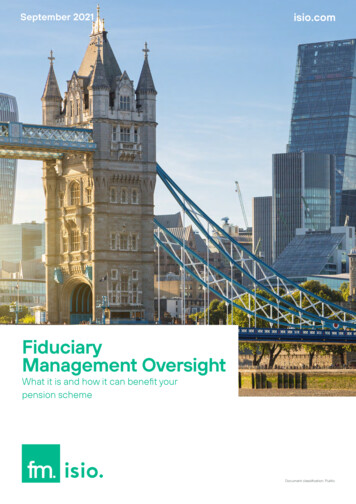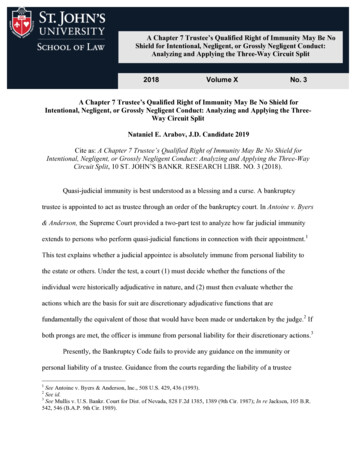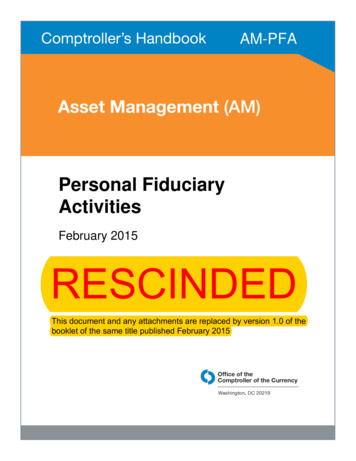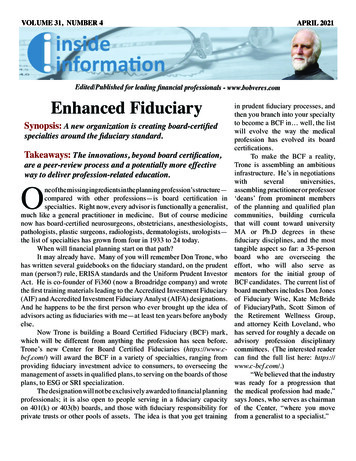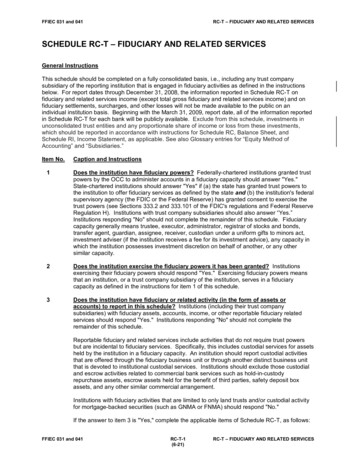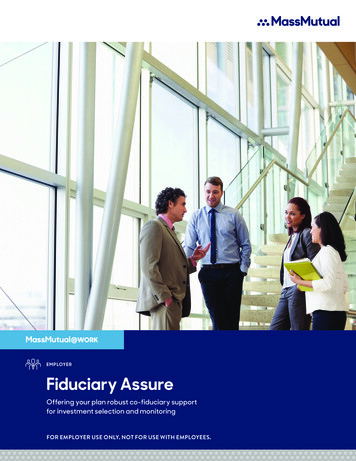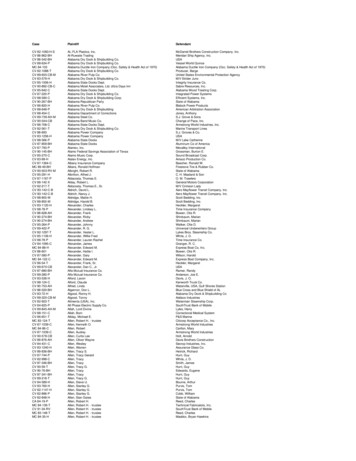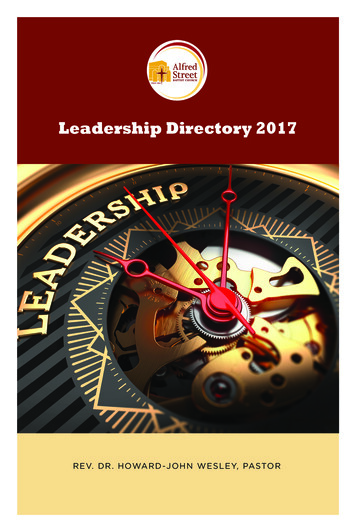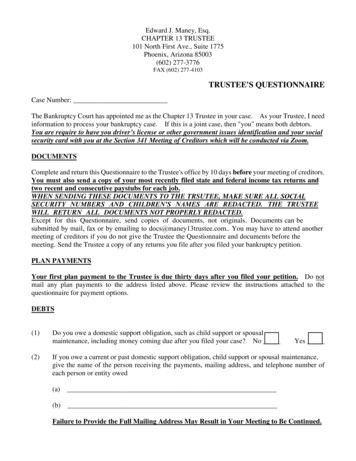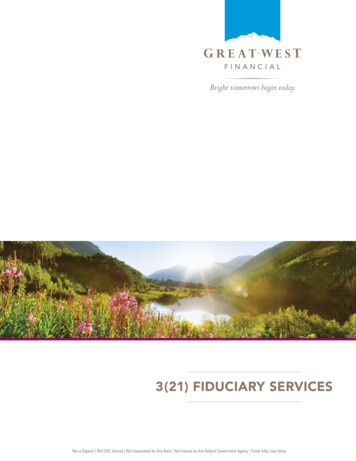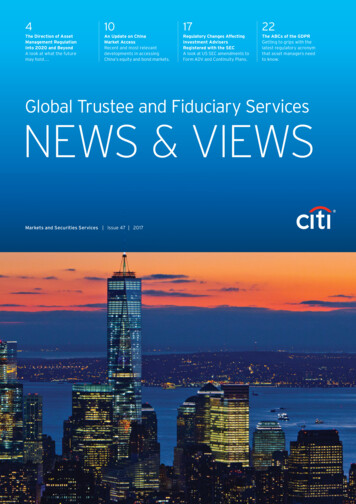
Transcription
4101722The Direction of AssetManagement RegulationInto 2020 and BeyondA look at what the futuremay hold . . .An Update on ChinaMarket AccessRecent and most relevantdevelopments in accessingChina’s equity and bond markets.Regulatory Changes AffectingInvestment AdvisersRegistered with the SECA look at US SEC amendments toForm ADV and Continuity Plans.The ABCs of the GDPRGetting to grips with thelatest regulatory acronymthat asset managers needto know.Global Trustee and Fiduciary ServicesNEWS & VIEWSMarkets and Securities Services Issue 47 2017
CONTRIBUTORSKaren L AnderbergPartnerDechert LLPkaren.anderberg@dechert.com 44 (0) 20 7184 7313Brónagh MaherProfessional Support LawyerMathesonbronagh.maher@matheson.com 353 1 232 3757Matt BenceManagerPricewaterhouseCoopers LLPmatthew.bence@uk.pwc.com 44 (0) 20 7212 4462Paul MoloneyOf CounselEversheds Hong Kongpaulmoloney@eversheds.com 852 2186 3295Karishma BrahmbhattSenior AssociateAllen & Overy LLPkarishma.brahmbhatt@allenovery.com 44 (0) 20 3088 2158Giedre PlentaiteSenior AssociateArendt & Medernachgiedre.plentaite@arendt.com 352 40 78 78 644Floris van de BultPartnerClifford Chance LLPfloris.vandebult@cliffordchance.com 31 (0) 20 711 9158Marian ScheeleSenior CounselClifford Chance LLPmarian.scheele@cliffordchance.com 31 (0) 20 711 9524Dan HanqvistFinance & Regulatory CounselRoschierdan.hanqvist@roschier.com 46 8 553 191 17Guy SearsDirectorJust Fines Limitedguyrwsears@justfines.co.ukAshley KovasSenior Regulatory Intelligence ExpertThomson Reutersashley.kovas@thomsonreuters.com 44 (0) 20 7542 2898Isabelle LebbePartnerArendt & Medernachisabelle.lebbe@arendt.com 352 40 78 78 510Shay LydonPartnerMathesonshay.lydon@matheson.com 353 1 232 2735Robert SmitsCounselClifford Chance LLProbert.smits@cliffordchance.com 31 (0) 20 711 9356Patricia TaylorPartnerWilliam Frypatricia.taylor@williamfry.com 353 1 639 5222
Global Trustee and Fiduciary Services News and Views Issue 47 2017CONTENTS03INTRODUCTIONAmanda Hale39UNITED KINGDOMHow to Get Comfortable withPersonal AccountabilityMatt Bence04INTERNATIONALThe Direction of Asset ManagementRegulation Into 2020 and Beyond:What Might the Future Hold?44ASIAUpdate: China Market AccessWill the Dutch Implement a Bonus Capfor AIFMS and Managers of UCITS?Floris van de Bult, Marian Scheeleand Robert SmitsGuy Sears10NETHERLANDS48Paul MoloneyLUXEMBOURGCompany Law Reform: What Are theOpportunities for Investment Funds?Isabelle Lebbe and Giedre Plentaite17UNITED STATESRecent Regulatory ChangesAffecting Investment AdvisersRegistered with the SEC54UNITED KINGDOMShould Enforcement Be Separatedfrom the UK’s Financial Regulators?Ashley KovasKaren L Anderberg22EUROPEThe ABCs of the GDPR: Gettingto Grips with the Latest AcronymYou Need to Know61SWEDENCatching up on a New Kind ofCorporate Fund in SwedenDan HanqvistKarishma Brahmbhatt28EUROPEThe Fourth EU Anti-MoneyLaundering Directive: How Will itImpact the Asset Management andInvestment Fund Industries?Patricia Taylor32IRELANDShifting Tides: Developing RegulatoryStrategy in a Dynamic EnvironmentShay Lydon and Brónagh Maher66GLOSSARY1
2Markets and Securities Services IntroductionINTRODUCTIONFollowing the publication of our MiFID II special edition last year,it is with renewed pleasure that we welcome you to our first editionof Global Trustee and Fiduciary Services News & Views for 2017. . .Amanda HaleHead of RegulatoryServices, Trustee andFiduciary Services, CitiAnd what better way to start the New Year than with a forward-looking piece that considers thedirection asset management regulation might take into 2020 and beyond. Not crystal ball-gazing, thisarticle, written by Guy Sears, previously the interim CEO of the Investment Association, rather offersan enterprising look at asset management derived from Guy’s ample experience. Plus there’s more. . .Our industry insight includes a host of other themes, topics and questions that we believe are ofstrategic business interest to global asset management participants across the spectrum.In Asia, we follow the further opening of the Chinese market to foreign investors, most recentlywith the launch of the Shenzhen–Hong Kong Stock Connect programme in December 2016, whichincludes an expansion of cross-border regulatory and enforcement cooperation between HongKong’s Securities and Futures Commission and the China Securities Regulatory Commission tofacilitate real-time surveillance of activity in their respective markets.Moving to the US, we turn to the significant changes that will be of interest to investmentmanagement firms registered as investment advisers with the SEC, discussing the amendmentsto Form ADV, additional information about advisory business and the new Schedule R, andamendments to Schedule D.What happens when regulators work witheach other more? Asking what directionasset management regulation might takeinto 2020 gives us a sneak preview . . .
Global Trustee and Fiduciary Services News and Views Issue 47 2017Other topics covered in this edition . . .SeniorManagers andCertificationRegimeFCA AssetManagementMarket Study:Interim ReportHow do theyfigure in yourimplementationplans?4th EUAnti-MoneyLaunderingDirectiveAsset management focus . . .What’s the Central Bank of Ireland’sStrategic Plan for 2016-2018?Will there be a bonus cap for DutchAIFMs and UCITS managers?Should enforcement be seperated fromthe UK’s financial regulators?General DataProtectionRegulationWhat’s the latest on a new kind ofCorporate Fund in Sweden and onCompany Law Reform in Luxembourg?More broadly, asset managers will also be keen to review our articles on topics that will no doubtbe taking priority in their regulatory implementation plans for this year and over the next couple ofyears, specifically the GDPR, 4AMLD, SM&CR and potentially the UK’s Financial Conduct Authority’sAsset Management Market Study.In this edition, we also consider questions or topics arising from the Central Bank of Ireland’sstrategic plan, bonus caps for Dutch AIFMs and UCITS managers, the separation of enforcementfrom UK regulators, a new corporate fund in Sweden and Company Reform Law in Luxembourg.Of course, regulation does not stand still, as demonstrated by Europe’s proposals, madeon 21 December 2016, for a fifth anti-money laundering directive (due to come into effectat the same time as the fourth) and an associated proposal that aims to counter moneylaundering by criminal law.Nor are the findings of national competent authorities mutually exclusive, with BaFIN and Sweden’sFinansinspektionen being the latest regulators to raise concerns over active funds with a low activeshare (i.e. closet trackers), following the FCA’s Thematic Review on Meeting investors’ expectations— all of which were prompted by ESMA’s supervisory work on closet indexing early in 2016. We willcontinue to monitor developments as they unfold.We would like to thank all our external contributors for their time and insights: we are grateful tothem for sharing their knowledge and experience with us and our readership.In keeping with previous editions, we hope you continue to enjoy Global Trustee and FiduciaryServices News & Views, and invite you to contact our Regulatory Services team (see contactdetails at the back) with any questions you might have or interests to learn more aboutany regulatory matters not covered in this edition.3
4Markets and Securities Services InternationalTHE DIRECTION OF ASSETMANAGEMENT REGULATION INTO2020 AND BEYOND: WHAT MIGHTTHE FUTURE HOLD?This article considers what direction regulation, in particular of assetmanagement and the services around it, might take into 2020 and beyond.While past performance may not be an indicator of future performance ininvestment, when it comes to regulation, a consideration of the immediatepast and present should help identify some of the major trends.Asset management is a global business, and thefirms participating in delivering such services andoperating funds do so globally. Global regulationhas not always been with us. The last millenniumwas characterised by an ever-increasing adoptionof models of regulation across nations joiningIOSCO, often adopting US or more latterly UK/EU templates.1 At first national policy dynamicswere about what should be regulated andhow. Now that most nations have introducedcomprehensive regulatory regimes, the policydynamics are now as much if not more at thelevel of the regulators since they broadly sharethe same high-level responsibilities, those ofconsumer protection, prudential strength andfinancial stability.This article reflects a realisation about whathappens when regulators work with each othermore. Some readers will have got this long ago,but it is now widely understood from experienceof talking with firms and regulators in the US,Canada and Japan during 2016 that globalregulation for firms is no longer merely aboutwhat rules one needs to comply with to carryon business outside your home territory: it isalso the study of what ideas may be importedto your home territory from outside. The USDepartment of Labor, Canada’s securitiesregulators and Japan are all exploring localinitiatives on duties of care, commission biasand better cost disclosure, whose paradigms canall be traced to the UK’s RDR.2 This is not to saythat there is an unquestioning acceptance ofan idea from another regulator. But it is a claimthat if you want to plan for future regulationin the USA, for example, it is no longer safe toignore ideas that are emerging in Europe.So this article speculates on what ideas, whatnew paradigms of regulation even, might excitethe interest of regulators in other countries.Of course, not every country will take thesame approach, and some countries will notconstitutionally alter the roles of its regulators.But in asking what the next 10 years mightbring, this article, which takes an unashamedview from the UK outwards in several examples(not least because of the article’s provenancewhere the UK regime is perhaps betterunderstood), hopes to show how such ideasmake sense and, got right, can potentiallyimprove the cost-effectiveness of regulation.Time for stocktakingIn the years since the Lehman collapse, we havebecome so engaged with some subjects andorganisations that it is hard to believe they are lessthan eight years old. A few of such topics include:Financial Stability Board — financialstability as a non-banking themeFinancial Conduct Authority (FCA)— having competition powersThe real economy — distinguishingmost other parts of the economyfrom financial servicesSome themes are longer-standing — consumerprotection has been at the centre of regulationsince the modern era of UK regulation commencedon 28 April 1988, itself hugely influenced by 50years of US regulation beforehand. So it is withconsumers that our forward look begins.
Global Trustee and Fiduciary Services News and Views Issue 47 2017Looking forward — in the interests of consumersGiven banks’ role in the economy and in society,people are debating, similarly to Lord Turner’sreference to the debate on financial stability,“whether and under what circumstances we canbe confident that the impact of [bank and nearbank] activities will be beneficial for the realeconomy and thus for human welfare”.3 Moregenerally, financial services should operate inthe interests of consumers, whether directly orthrough wider welfare benefits. But consumerscome in all shapes and sizes. And the FCA’sobjectives require it to consider as a consumer,not only you and I, but also the biggest assetmanagers and insurers, when provided withservices by banks in the capital markets.For the FCA, therefore, consumers can include anyperson who may be affected by the impacts thatfinancial services may have on the real economy.But decades of focus on consumer protection bySROs, the FSA and the FCA, leave many strugglingto know if the vast investment in consumerprotection was worth it.4 To an outsider, staggeringlevels of fines, redresses and complaints appearto continue unabated. In part, the past responseto this was to reorganise the regulators, both inthe UK and in the EU, and to write more rules.But many of these approaches can’t be expectedto last into the 2020s. While there are alwayslegitimate cries from politicians and society tostop the repetition of past scandals, lawyers andconduct policy staff now know that writing rulesmerely directed at some past event is a failedparadigm and deeper, evidence-based approachesneed to be employed. In that regard, there arealready emerging two new (and linked) trends inconsumer protection, both being led or embracedby the FCA, that can be expected to continue.Regulatory ToolThe first trend relates to the tools used byregulators. Simply put: rule-making does notappear to have been effective in preventingmisselling, manipulation or market failures.Yet after the fact, the rulebook provides aplethora of penalties that can be imposed onindividuals and firms. Two new powers pointto new approaches by regulators.Powers for product intervention will soonbe complemented by target marketrequirements across the EU. And while theUK has had product provider responsibilitiesguidance for some years, the newer powerscan only lead to a greater fear of forecastintervention.5 In return, that fear will likelyincentivise far clearer descriptions of whatproducts, including funds, are designedto do. Arguments that manufacturers purelyproduce components based on asset classes,while historically legitimate, do sit uneasilywith outcome-focused, lifestyle and similarlymarketed funds.But it is the second set of new powers thatwill provide the greatest refocus of consumerprotection — the competition powers that theFCA has been given put it in a very selectgroup among the world’s securities regulators,allowing the FCA to analyse much deeperstructural issues and propose solutions that canuse all its powers, including better rule-making.The final outcome of the asset managementmarket review is only a likely start in this area,as the competition approach will likely inform,and be used in, the 2017 review of the RDR.5
6Markets and Securities Services InternationalThe FCA Asset Management Market Study Interim ReportThe FCA’s long-awaited interim report into the UK’s asset management and funds industry waspublished on the 18 November 2016. While enquiring into institutional and retail (fund) business,it also looks at some of the roles of investment consultants. It does not, however, go into the samedepth on distribution and excluded advisers; the RDR review due in 2017 must be a likely startingpoint for a deeper consideration of advisers and other intermediaries.The interim report combines two interlockingaspects of the FCA’s work. On the one hand, theReport uses econometric analysis and raises issuesthrough a competition lens; on the other, severalother parts of the Report gather together policythemes that have been more or less discussed bythe fund industry, commentators and consumergroups, if not the FCA, since the financial crisis.So transparency and the signals that investorsuse to decide what to buy, or sell, are explored.» Firstly, the FCA asks if fund governance needsoverhauling. Whether adopting a US mutual fundstyle board, adopting a majority independentboard or using the depositaries, the FCA islooking for an investors’ champion to providefar higher levels of independent assuranceabout value of money and cost oversight. Thiscould embrace reviews of the fee charged bythe investment manager and of the transactioncosts incurred in trading in the capital markets.The FCA finds weak price competition, thatactively managed fund charges have notreduced significantly over the last decade, thatthere are price clusters at 75 and 100 bps andthat asset managers enjoy substantial margins.» Secondly, the FCA asks, echoing the FinancialServices Consumer Panel, whether a move tosome form of all-in-one fee would be in investors’interests. Variations on this theme would involvethe fund manager bearing more or less of therisk of budget overruns and transaction costs.Turning to the funds themselves the FCA hasconcerns that objectives are not adequatelyexplained to investors, that some active fundstrack to the market benchmark to an extent thatinvestors would be better off buying cheaperpassive funds and that anyway after costs onaverage actively managed investments do notoutperform their benchmarks.Though the FCA mentions the difficulties fundmanagers have in switching investors in older,more expensive legacy classes into clean shareclasses, it offers little in the way of radical change.In several other areas, however, the FCA is askingwhether much more radical change is warranted.» Thirdly, the FCA asks in several areas abouthow better information can be provided toinvestors and within that, whether signals thatidentify underperformers could be found.The FCA is asking for comments by 20February 2017 and is expected to make finalrecommendations for change in the second half of2017. Many will be responding, not only with regardsto their UK funds but also with a PRIIPs lens on,on how this will affect the competitive landscapewith passported-in EU funds (now and after Brexit)and unit-linked business and investment trusts.
Global Trustee and Fiduciary Services News and Views Issue 47 2017Consumer responsibilityThe second trend is the desire to grapple withthe concept of consumer responsibility. Debateabout how much a regulator should intervene— either across a sector through rules or withan individual firm through supervision — hasfor years been hobbled by the absence of anyclear articulation of the nature and limits ofconsumer responsibility.6 Andrew Bailey, theFCA CEO, announced in July that there wouldbe a public consultation on whether someconsumers should be prioritised over othersand the wider balancing exercise of firm,consumer and regulator responsibilities.7The paper is now out and all interested groupscan now debate the best way forward.8Importantly, this debate will occur after twokey groups have altered their approaches tothe issue. The first are consumers themselves,together with the political class. The 2008financial crisis can be understood to havereversed the burden of proof on financialservices and related themes. Beforehand,despite being a licenced activity, there was abroad assumption that financial services, moreliquidity and universal banks each broughtbenefits. Now it is understood that thereare boundary conditions to each of theseassumptions, viz they are true up to a point.Since the financial crisis, society expects thefinancial services industry to demonstrate thatwhat it proposes will not cross that line.Equally important, when considering itsapproach to consumer responsibility, theFCA is changing its mindset. It is embracingbehavioural economics. Rather than presumeconsumers have unlimited capacity to learn andchoose, regulators have noticed that “a rapidlygrowing literature on behavioural economicsshows that some errors made by consumers arepersistent and predictable.” 9 Taken together,we can expect a regulator to spend much moretime understanding what responsibility meansin light of real-world biases and to adjust rulesaccordingly. There will be no bonfire of rules,but there will be pruning and replacing.Brexit needn’t be expected to cause anysignificant alteration of consumer protection.Indeed in the EU, the UK has been either asource or a supporter of many EU consumerfocused initiatives. But the UK will be freer tofollow these trends to a different and potentiallyfaster timetable than the EU. Even if equivalencewith the EU is a key constraint on future UKregulatory initiatives — and how much the UKis willing to so limit itself is still a very openissue — it is likely that all these approaches, suchas following a mission based on an articulatedposition on consumer responsibility, usingproduct intervention, carrying out furthermarket reviews using competition and thenimplementing corrective rules after — will passan equivalence test. However, the associatedconcern related to any passing of such test willbe the safeguards attached to its granting andhow easily they can be withdrawn.These trends are part of a bigger question,however, that the UK government at or afterBrexit must address. What is the right level ofpaternalism in relation to financial services? 10Again, this question will be asked in a newsociopolitical context. The first decade ofUK regulation could be said to have beenfocused on investors, with all the higher-networth, discretionary-spend impressions thatsuch terms can give. Some in the industryunderstandably still prefer terms like “clients”and “investors” but these terms do not sitso well with a new cohort of individualswhose interests and long-term security inparticular UK governments of every politicalpersuasion will seek to promote: those savingfor retirement and later life. Around 8 millionpeople already save into a private pensionand contributions are around GBP20 billion ayear.11 The numbers will increase significantly.This political refocus from consideringpeople as investors to considering them asindividuals saving for retirement throughinvesting will challenge how regulation drawsa distinction between products and servicesand the boundaries of advice.Historically,regulation hasdistinguishedbetween productsand services.But solutions that allowindividuals to save forretirement throughinvesting and then managetheir later-life income willrequire a reengineering ofexisting products.7
8Markets and Securities Services InternationalFor example, with increasing life expectancyand changing work patterns, it must belikely that individuals will want to be able tonot only accumulate, obtain an income andre-invest that (as now), but also at timesconsume some of the capital to cover gapsin income and meet unpredictable expenses(such as for health) and then to re-accumulatethrough new work.The direction ofregulation willdepend on the extentto which societyand politicians canbe confident thatfinancial servicesactivities are indeedbeneficial for the realeconomy and so forhuman welfare.Previously, much of the advice andassistance in this area expected a discreteperiod of accumulation through investingand a discrete period of decumulationthrough an annuity. This system where, formany, advice basically ends as the phaseof accumulation ends, is not fit for thenew order. This new complex of cycles ofaccumulation and expenditure will requireadvice and assistance as to what capital tospend — between a series of funds — to meetincome shortfalls and where to top up. Morelikely, it will demand default-like productsthat are wrapped in what are effectivelyservices so as to be done efficiently and ina manner that sufficiently protects this newmodel’s “invested saver”, who spends littletime considering such issues.Additionally, at some point downside risk willbe addressed by some products. The endingof compulsory annuitisation has left a gapon downside risk. Survey after survey ofconsumers show they do not want to carryany significant downside risk (unsurprisingly).Part of the services wrapped around a fundmay include insurance, a phased-in annuitycomponent or risk immunisation usingderivatives. Regulation will need to ensureit keeps pace and this, more than Brexit, willrefocus the FCA. The Financial OmbudsmanService (FOS) and the Financial ServicesCompensation Scheme (FSCS) will need tobe stress-tested to ensure they are rightlyconfigured to address the next 10 or 20 yearsof post-pension freedoms.Across the Atlantic, just as the Departmentof Labor has attempted in the US, so we shallneed to look at regulation from the investedsaver’s viewpoint, ensuring regulation does notdistort competition while ensuring total cost ofownership, information, tools and options areequivalently approached across all competingproducts. In that regard, the Financial AdviceMarket Review (FAMR) has proposed changesto what constitutes regulated advice. Butit has recognised as necessary that “theFCA also considers whether it needs anyadditional powers to address the potentialrisks from unregulated firms operating inthis space”.12 Powers of a regulator over theunregulated sounds like regulation, and it islogical to expect to conclude in due coursethat the regulated activity of advice speaksto the age when investors were the subject ofregulatory thought and that to protect investedsavers using multilayered serviced products,regulation should be looking at “advice orassisted guidance in relation to an individuals’later-life provision”.13The bilateral distinction between regulated andunregulated will need to reduce and ensurea much more blended approach is taken toguidance and online assistance that is neitheradvice nor something that should be leftunregulated. Even in countries where the stateremains responsible for later-life provision, theadvance of technologies will rapidly challengethe current hard-edge to regulation of advice
Global Trustee and Fiduciary Services News and Views Issue 47 2017that effectively starts from a consideration ofthe position and experience of firms and not ofthose of consumers.Away from immediate consumer protection,and even as the age of asset managementdawns, and society relies evermore onindividuals to save for their own retirementprovision, fears over financial stability remain.The UK will continue to play a significant partin global bodies such as the FSB and IOSCO onthis subject. This will be particularly importantas the discussions on stress-testing fundsramps up. In the EU or not, the influence ofthe UK will, as ever, come down to individualsand the extent to which Mark Carney orAndrew Bailey play key roles in committees.Global engagementBilateral engagement among regulatorsglobally is already high, and sharedexperiences of auto-enrolment and RDR willlikely ensure continued engagement withAustralian and Canadian colleagues. For thefunds industry, international questions maypresently be dominated by Brexit. Assumingsingle market access is no longer unlimited,managers will need to understand what theramifications are for all the other activities,such as solicitation, marketing and aftersalescare. But after that come the bigger globalquestions. Will the UK outside the EU nowallow Chinese and other funds the mutualrecognition they seek? Mutual recognitionis now a card that the UK government canplay, but so can the EU. There, however, theexperience of the AIFMD may be telling.Perceived hostility to third country funds isunlikely to turn to a full embrace in the EUunless there is a huge political gain at stake.China, India and Indonesia may offer that,but the UK is likely to start from a more openmindset to the concept of third country firmsand funds passporting in.14In 2008, as the financial crisis spread andLehman collapsed, people, including lobbyists,politicians, legislators, began using a newphrase to express what financial services didand why it was important. It was the term,“real economy”. Debate can be had as to whatis in or out, but its use, indeed its widespreadadoption as a lens through which to considerwhat the financial services industry is doing,institutionalises an “us and them” approachto regulation and wider financial stabilitypolicy. This division remains a huge risk forasset managers, perhaps as much as for anyother part of financial services, as it suggeststhese allocators of capital to businesses andsuppliers of later-life income are somehowseparate from the world of invested savers (orsaving investors), and are not a componentof the real economy. More than Brexit, morethan the level of an index, more than inflationfigures, the direction of regulation will dependon the extent to which society and politicianscan be confident that financial servicesactivities are indeed beneficial for the realeconomy and so for human welfare.Guy Sears International Organisation of Securities Commissions.1 Retail Distribution Review (RDR).2 “What Do Banks Do, What Should They Do and What PublicPolicies are Needed to Ensure Best Results for the RealEconomy?”, speech by Lord Aidar Turner at Cass BusinessSchool, 17 March 2010.34 SROs are Self-Regulatory Organisations that, alongwith the Securities and Investments Board, enforced UKregulation until 2001, when they were replaced by theFinancial Services Authority (FSA). The FSA was replacedby the FCA from 1 April 2013. From rppd/RPPD Full 20160321.pdf,last downloaded on 30 November 2016.5 The fourth principle of good regulation imposed on the FCA isentitled “Consumer responsibility” and it states “Consumersshould take responsibility for their decisions.” History hasshown this is broadly uninformative.6 Speech by Andrew Bailey at the FCA’s 2016 annual publicmeeting, accessible at es, last accessed on 30 November 2016.7 See ments/our-future-mission, last accessed on 30 November 2016.8 From rs/occasional-paper-1.pdf, last downloaded on 30 November 2016.9 Despite not being gender neutral, the term seemed apposite.10 From ds/attachment data/file/556011/September 2016 Pensionspublication.pdf, last downloaded on 30 November 2016.11 See page 32 of FAMR’s final report, available at final-report.pdf, lastdownloaded on 30 November 2016.12 Arguably this is similar to what has motivated the USDepartment of Labour, available at le-to-address-conflicts-of-interest, lastaccessed on 30 November 2016.13 China, India and Indonesia are only three examples amongo
Global Trustee and Fiduciary Services NEWS & VIEWS 4 The Direction of Asset Management Regulation Into 2020 and Beyond A look at what the future may hodl . . . 10 An Update on China Market Access Recent and most relevant developments in accessing China's equity and bond markets. 17 Regulatory Changes Affecting Investment Advisers
